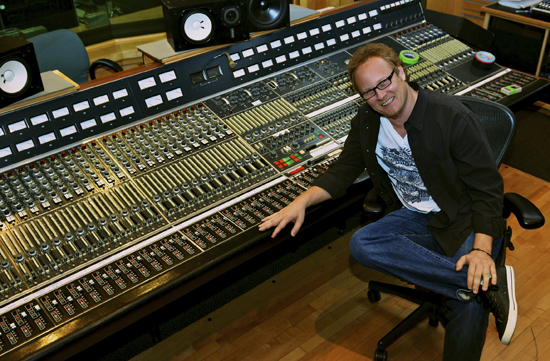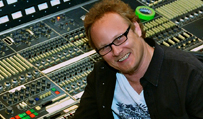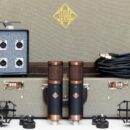 Producer, engineer and mixer Bill Appleberry started his career as a musician in the Chicago area. He found that he was doing a lot of his own keyboard programming, which evolved quickly into engineering and ultimately expanded to production. He spent several years working in Washington, DC but recognized that he was getting increasingly more work in L.A. So, with $600 in his pocket, he relocated. It took him exactly one day to find a job with A&M Records and after six months he spun out on his own. He’s since worked with artists including Stone Temple Pilots, the Used and Taking Back Sunday. He’s also jammed with bands, including keyboard work on Kiss’ Psycho Circus.
Producer, engineer and mixer Bill Appleberry started his career as a musician in the Chicago area. He found that he was doing a lot of his own keyboard programming, which evolved quickly into engineering and ultimately expanded to production. He spent several years working in Washington, DC but recognized that he was getting increasingly more work in L.A. So, with $600 in his pocket, he relocated. It took him exactly one day to find a job with A&M Records and after six months he spun out on his own. He’s since worked with artists including Stone Temple Pilots, the Used and Taking Back Sunday. He’s also jammed with bands, including keyboard work on Kiss’ Psycho Circus.
In 2011 Appleberry landed the production gig for NBC’s singing competition The Voice and has produced every one of the show’s contestants. How the job came about is as much about talent and experience as it is about building a rapport. “I went out for it just like any other record,” he recalls. “There were multiple producers that were bidding on it. I put a team together and after talking frequently to Tom [Mackay, who was integral in launching The Voice], it segued into getting the gig.”
The Voice contestants commonly have minimal formal experience and when Appleberry records them, each is allotted an hour of studio time. “I approach everything like I’m making a record,” he explains. “I’ll get as much as I can out of each of them in that hour and that’s what it’s gonna be. I’ll take the best pass and put it together. When I make records, I’ve spent whole days trying to get a verse. These kids will come in and sing it top to bottom. They’re so excited to be in a studio. It makes my job a lot easier.”
Appleberry finds that many of the young contestants perform well in the studio but often get nervous once the cameras turn on. So he changes the studio energy to bring it in line with that of the show. Being supportive comprises a large part of his job. “There’s a lot of coaching, a lot of producing and a lot of keep-your-spirits-up kind of thing,” he observes. “With the ones that have some experience, it’s more about getting great performances. I’ve had kids in the studio where we’ve got it after two passes. But I have to give them the full hour so they can experience the whole thing.”
TV has proven fertile ground for him. What does he view as its unique advantages? “I see a little bit of a thing going on with TV and music,” he says. “It’s a nice integration. With us, you can buy [an artist’s] single on iTunes and it’s not just taken off the show. I think we offer these kids a preparation for the record business. When they come to the studio, it’s not just recording the song. It’s about continuing to the experience of making records. Once they leave the show, they’re in the record business, not the TV business.
“Working on The Voice has taught me how to make quick decisions,” Appleberry continues. “In the past, it was easy to overthink things. But in this case there isn’t a lot of time. I’m blowing mixes out in three hours.”
While on hiatus from his Voice gig, Appleberry continues to write songs and mix. At interview time, he was mixing for a band slated to play Warped Tour 2012. He credits his Voice production squad for the high quality of work that they turn out. “Brian Dong, Tim Harkins, Navon Weisberg and Kevin Mills: they’re a team of assassins,” he asserts. “I couldn’t do this without them.”
Contact Bennett Kaufman / The BK Entertainment Group, 818-728-8200, [email protected]











